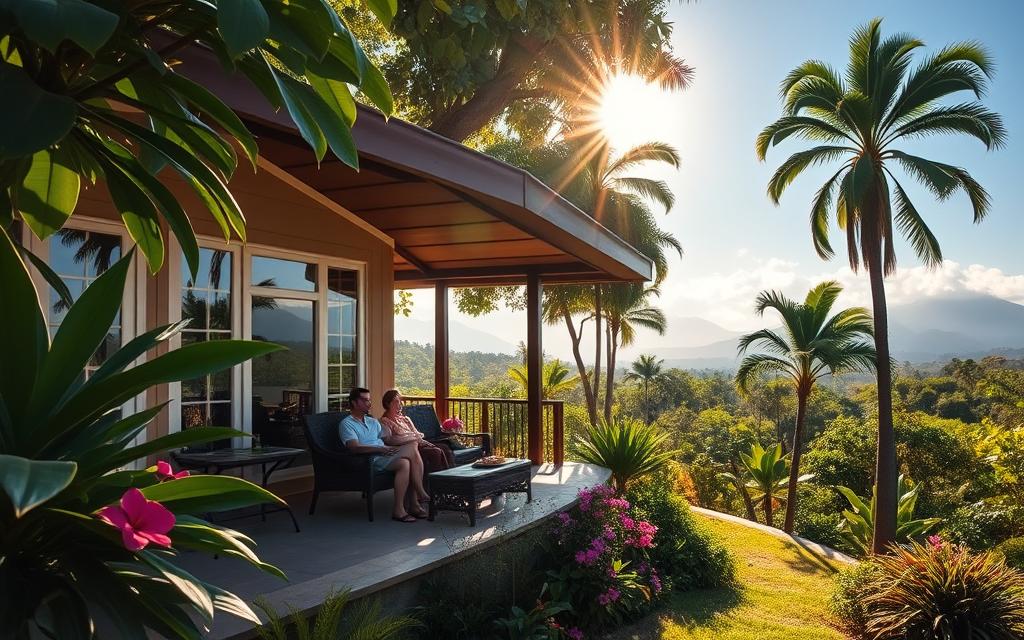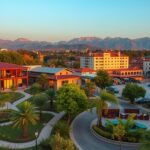Healthcare Access for Resident Families in Costa Rica

Did you know Costa Rica ranks among the top 20 public healthcare systems globally? This small Central American nation is celebrated for its universal coverage, ensuring quality care for all. Its system, managed by the Caja Costarricense de Seguro Social (CCSS), is a key reason many choose to call this place home.
Expats and locals alike benefit from the CCSS, which offers affordable and comprehensive services. Whether you’re seeking routine check-ups or specialized treatments, the system ensures everyone is covered. This universal approach has made Costa Rica a top destination for those seeking a better quality of life.
With diverse residency options like rentista and investment programs, the country welcomes newcomers. These pathways not only provide stability but also grant access to the renowned costarricense seguro social. For families, this means peace of mind and a healthier future.
Introduction: Residency and Quality of Life in Costa Rica

Costa Rica’s appeal lies in its blend of natural beauty and modern conveniences. Its mild climate, rich culture, and high quality of life make it a top destination for expats and families. The country’s healthcare system complements this lifestyle, offering both public and private options to meet diverse needs.
Many newcomers choose private insurance to supplement public services. This approach ensures access to high-quality care at a fraction of the cost compared to other countries. Residency programs, such as the Pensionado and Rentista visas, play a key role in securing these benefits.
Why Costa Rica Attracts Families and Expats
The synergy between quality healthcare and lifestyle improvements is a major draw. Expats enjoy lower living costs, a welcoming community, and a focus on well-being. Programs like the Investor Visa further enhance opportunities for those looking to settle long-term.
With over 10% of the population being expats, Costa Rica has built a reputation for inclusivity. Its residency options not only provide stability but also open doors to a healthier, more fulfilling life. For more details on the Pensionado Visa, visit this guide.
Overview of Costa Rica’s Healthcare System

Costa Rica’s healthcare system is a model of efficiency and inclusivity. It combines public and private services to ensure comprehensive care for everyone. This dual structure is a key reason the country ranks among the top globally.
Dual Structure: Public and Private Integration
The public system, managed by the Caja Costarricense de Seguro Social (CCSS), provides universal coverage. It ensures access to essential services for all citizens and residents. Private facilities complement this by offering specialized care and shorter wait times.
This integration allows expats and locals to choose the best option for their needs. Many opt for private insurance to supplement public services. Together, these systems create a robust network of care.
Global Rankings and Patient Satisfaction
Costa Rica consistently ranks high in global healthcare evaluations. The World Health Organization places it above countries like the United States and New Zealand. Patient satisfaction levels are equally impressive, reflecting the system’s effectiveness.
Recent infrastructure upgrades have further enhanced service quality. New hospitals and clinics ensure better access to care. These developments solidify Costa Rica’s position as a leader in Latin American health systems.
Healthcare access for resident families in Costa Rica

The CCSS provides a safety net for families seeking reliable medical services. Once residency is obtained, families can enroll in the seguro social system, ensuring comprehensive coverage for all members. This mandatory insurance requires contributions based on income, making it accessible to everyone.
Routine check-ups, emergency care, and specialized treatments are all part of the services covered. Families benefit from a seamless integration of public and private options, ensuring quality care for every need. Understanding the enrollment process is key to unlocking these benefits.
The seguro social system extends its coverage to dependents, offering peace of mind for families. Whether it’s preventive care or urgent medical attention, the CCSS ensures everyone is protected. For more details on enrolling dependents, visit this guide.
With a focus on inclusivity, the system guarantees that no family is left without care. From newborns to seniors, the CCSS provides a robust network of services. This universal approach makes Costa Rica a leader in accessible and reliable medical care.
Residency Options and Their Impact on Healthcare Enrollment

Securing residency in Costa Rica opens doors to its renowned healthcare system. Different programs, such as Rentista, Investment, and Permanent Residency, offer unique pathways for expats and families. Each option comes with specific requirements and benefits, directly influencing access to the Caja Costarricense de Seguro Social (CCSS).
Rentista, Investment, and Permanent Residency Explained
The Rentista program is ideal for those with a steady income. It requires proof of monthly earnings, ensuring eligibility for the CCSS. Contributions are income-based, making it a cost-effective choice for many.
Investment Residency appeals to those willing to invest in the country. By meeting the financial threshold, expats gain access to the public health system. This option is perfect for long-term planners seeking stability.
Permanent Residency offers the most comprehensive benefits. After meeting initial requirements, individuals enjoy full access to the CCSS. This path is ideal for families looking for long-term health coverage.
Each residency type impacts contributions to the CCSS differently. Rentistas and investors pay based on their income, while permanent residents benefit from fixed rates. Understanding these differences helps expats choose the right path.
For families, enrolling in the CCSS ensures comprehensive coverage for all members. From routine check-ups to emergency care, the system provides peace of mind. Selecting the right residency option is the first step toward securing quality health insurance.
Navigating the Public Healthcare System: Caja Costarricense de Seguro Social

Understanding how to navigate the Caja Costarricense de Seguro Social (CCSS) is essential for expats and locals alike. This system provides universal coverage, ensuring everyone has access to quality medical care. Knowing the enrollment process and services offered can make the experience seamless.
Enrollment Process and Required Documentation
To enroll in the CCSS, you’ll need specific documents. These include your passport, residency approval, and employer forms if applicable. The process is straightforward but requires attention to detail.
Once your documents are ready, visit your local CCSS office. The staff will guide you through the steps. Contributions are based on a sliding scale, determined by your monthly income. This ensures affordability for all residents.
Services Covered by the CCSS
The CCSS offers a wide range of services. From routine check-ups to surgeries, the system ensures comprehensive care. Preventive measures and emergency treatments are also included.
For families, the CCSS extends coverage to dependents. This means everyone in your household can access quality care. Understanding these services helps you make the most of the system.
Practical tips can streamline your enrollment. Keep all documents organized and visit the CCSS office early to avoid long waits. This ensures timely access to the services you need.
Private Healthcare Facilities and Insurance Choices
Costa Rica’s private medical facilities are renowned for their efficiency and high standards. These institutions complement the public system by offering shorter wait times and specialized services. For expats, private care often provides a more personalized experience.
Top Private Hospitals and Clinics in Costa Rica
Several private hospitals stand out for their quality and reputation. Clínica Bíblica, Clínica Católica, and CIMA Hospital are among the most trusted. These facilities are equipped with advanced technology and staffed by highly trained professionals.
Expats often choose these hospitals for their reliability and convenience. They cater to a wide range of medical needs, from routine check-ups to complex surgeries. Their focus on patient satisfaction makes them a top choice for those seeking private care.
Selecting a Suitable Insurance Plan for Expats
Private insurance is a popular option for expats looking to supplement public coverage. It offers flexibility and access to a broader network of providers. Plans from companies like INS and international insurers like Cigna Global are widely used.
When choosing a plan, consider factors like coverage scope, premiums, and network hospitals. Many expats opt for policies that include both inpatient and outpatient services. This ensures comprehensive protection for all medical needs.
Pairing private insurance with public coverage provides the best of both worlds. It reduces wait times and ensures access to specialized care. For expats, this combination offers peace of mind and quality service.
Cost Efficiency: Comparing Public and Private Healthcare Costs
One of the most appealing aspects of living in Costa Rica is its affordable and efficient healthcare system. The caja costarricense, or CCSS, ensures universal coverage with income-based contributions, making it accessible to all. Private options complement this by offering specialized care at a fraction of the cost compared to other countries.
Analyzing Average Monthly Contributions and Out-of-Pocket Costs
Public healthcare contributions range from 7% to 11% of monthly income, ensuring equity for all families. For example, someone earning $2,000 would pay between $140 and $220 monthly. This sliding scale makes the costarricense seguro system highly affordable.
Private insurance plans, on the other hand, vary widely. Comprehensive coverage can cost between $300 and $700 monthly. Routine services like dental cleanings or eye exams are also budget-friendly, averaging $30 to $75 per visit.
The cost efficiency of Costa Rica’s healthcare model is a major draw. Whether you choose public or private options, the system ensures quality care without breaking the bank. This balance makes it a top choice for expats and locals alike.
Quality and Accessibility of Medical Services for Expats
Costa Rica’s medical services are globally recognized for their excellence and accessibility. The system consistently ranks high in international evaluations, reflecting its commitment to quality care. Expats benefit from a network of skilled professionals and modern facilities designed to meet diverse needs.
High Global Rankings and Quality Care
The country’s healthcare system is ranked among the best in Latin America. Doctors and specialists often receive training in the United States or Europe, ensuring high standards of care. Patient satisfaction is a top priority, with many facilities offering personalized services.
Public facilities provide comprehensive care, but wait times can be longer for non-emergency cases. Private options, on the other hand, offer faster appointments and specialized treatments. This dual structure ensures that every person can access the care they need.
Managing Wait Times and Service Availability
While public facilities are reliable, overcrowding can lead to delays. Expats often supplement public coverage with private insurance to reduce wait times. This approach ensures access to timely and efficient care.
For those relying on public services, planning ahead can help manage expectations. Scheduling appointments early and visiting facilities during off-peak hours can minimize delays. Understanding the system’s strengths and limitations is key to a positive experience.
Whether you choose public or private options, the quality of care remains a top priority. For more details on securing coverage for dependents, visit our guide on residency for dependents.
Medical Tourism and Specialized Procedures in Costa Rica
Costa Rica has become a global hub for medical tourism, attracting patients worldwide. The country’s blend of affordable care, skilled professionals, and advanced technology makes it a top destination for specialized treatments. From cosmetic surgeries to orthopedic procedures, the options are vast and accessible.
International patients often choose Costa Rica for its cost savings. Procedures like dental implants, facelifts, and knee replacements are available at a fraction of the cost compared to the U.S. This affordability, combined with high-quality care, ensures a positive experience for medical tourists.
Popular Treatments and Cosmetic Procedures
Cosmetic surgeries are among the most sought-after treatments. Procedures like breast augmentation and facelifts are performed by experienced doctors using state-of-the-art technology. Patients benefit from shorter wait times and personalized care, making the process seamless.
Orthopedic treatments, such as knee and hip replacements, are also popular. These procedures are performed in accredited facilities, ensuring safety and effectiveness. Many doctors have international training, providing confidence to patients seeking specialized care.
Benefits for International Patients
One of the main advantages is the lower cost of care. For example, dental implants cost significantly less than in the U.S., making it an attractive option for many. Patients also appreciate the shorter wait times, which allow them to receive treatment quickly.
Bilingual doctors and staff make communication easy for international patients. This ensures a smooth experience from consultation to recovery. The combination of affordability, quality, and convenience fuels Costa Rica’s growing medical tourism industry.
For those considering medical tourism, understanding the residency process can provide additional benefits. It ensures access to comprehensive care and long-term health solutions.
Family Health and Maternity Services in Costa Rica
Families in Costa Rica benefit from a robust system that prioritizes maternal and child health. From prenatal care to vaccinations, the system ensures comprehensive support for every stage of parenthood. Both public and private facilities offer high-quality services, making it a reliable choice for families.
Prenatal, Delivery, and Postnatal Care Options
Prenatal care here includes regular check-ups, ultrasounds, and nutritional guidance. These services are designed to monitor the health of both mother and baby. Public facilities provide these services at no cost, while private options offer more personalized treatment plans.
Delivery options include both vaginal and C-section procedures. Public hospitals ensure safe and professional care, often with shorter wait times for emergency cases. Private clinics provide additional comforts and faster scheduling for elective surgeries.
Postnatal care focuses on recovery and newborn health. Mothers receive follow-up check-ups, and babies are monitored for growth and development. Vaccination programs start immediately, ensuring newborns are protected from common illnesses.
Coverage for Newborns and Vaccination Programs
Newborns are automatically covered under the public system. This includes routine check-ups, vaccinations, and emergency treatment. The vaccination program is comprehensive, protecting against diseases like measles, polio, and hepatitis.
Private insurance plans also cover neonatal care, offering additional benefits like private rooms and faster access to specialists. These plans are ideal for families seeking extra comfort and convenience.
Whether you choose public or private care, the system ensures that every child receives the best possible start in life. From childbirth classes to postnatal support, families are well-supported throughout their journey.
Access to Specialists and Emergency Care
Accessing specialist care is a priority for many living in this Central American nation. Whether you’re managing a chronic condition or facing an urgent situation, the system ensures you receive timely attention. Both public and private options play a role in meeting these needs effectively.
Finding the Right Specialists in Urban and Rural Areas
Urban centers like San José offer a wide range of specialists, from cardiologists to dermatologists. Private facilities such as Clínica Bíblica and CIMA Hospital are equipped with advanced technology and highly trained professionals. These institutions ensure shorter wait times and personalized care.
In rural areas, access to specialists is improving but remains limited. Public facilities provide general care, while private clinics like Asembis bridge the gap. For urgent needs, emergency protocols ensure immediate attention, regardless of location.
Strategies for finding the right specialist include researching credentials and seeking referrals. Many doctors are trained internationally and speak English, making communication easier. Combining public and private options ensures comprehensive coverage for all health needs.
Emergency care is a highlight of the system. Private hospitals like Metropolitan Hospital offer 24/7 services, ensuring quick response times. Public facilities prioritize urgent cases, providing reliable support when it matters most.
Understanding the system’s strengths helps families navigate it effectively. Whether in urban or rural areas, timely medical care is always within reach. This balance makes the country a leader in accessible and reliable health services.
Understanding Healthcare Contributions and Monthly Payments
Understanding how monthly contributions work is key to managing your budget effectively. The system ensures fairness by using a sliding scale based on income. This approach makes it accessible for everyone, regardless of their financial situation.
Contributions to the public system range from 7% to 11% of monthly earnings. For instance, someone earning $2,000 would pay between $140 and $220. This sliding scale ensures that higher earners contribute more, while lower earners pay less.
Income-Based Contributions Overview
Here’s an example of how contributions break down for different income levels. A person earning $1,500 might pay around $105 monthly, while someone with a $3,000 income could contribute up to $330. These payments cover all family members, providing comprehensive protection.
Private healthcare options are also available for those seeking additional coverage. Plans from providers like INS offer flexibility and access to a broader network of clinics. These plans typically cost between $60 and $250 monthly, depending on the level of coverage.
Managing monthly payments efficiently requires planning. Start by calculating your expected contributions based on your income. Then, explore private options if you need specialized care or shorter wait times. Combining public and private coverage can provide the best of both worlds.
By understanding these financial aspects, families can make informed decisions. Whether you rely solely on the public system or supplement it with private insurance, the goal is to ensure quality care without straining your budget.
The Importance of Preventive Care and Regular Check-ups
Preventive care is the foundation of a healthy lifestyle, and Costa Rica’s system makes it accessible to all. Regular check-ups and early screenings are essential for detecting potential issues before they become serious. This proactive approach not only saves lives but also reduces the need for costly treatments later.
Both public and private facilities emphasize the importance of preventive measures. Vaccination programs, annual physical exams, and routine screenings are widely available. These services ensure that families can maintain their health without facing unnecessary risks.
Preventive practices also lower overall healthcare costs. By addressing health concerns early, families can avoid emergency situations and expensive procedures. This approach not only benefits individuals but also strengthens the entire system.
We recommend establishing a routine to stay on top of your health needs. Schedule regular visits to your doctor and keep track of vaccinations. Early detection and timely care are key to a healthier, more fulfilling life.
For families, preventive care is especially important. From children to seniors, everyone benefits from regular check-ups. This ensures that potential issues are identified and addressed before they escalate. Taking these steps today can lead to a brighter, healthier tomorrow.
Community Support and Expats’ Experiences
Building a strong community is an essential part of settling into a new country. For expats, connecting with others helps ease the transition and fosters a sense of belonging. Networking and social events play a key role in creating these connections.
Local and online communities offer a platform for sharing information and experiences. These networks provide valuable insights into navigating the local culture and systems. Many expats find comfort in knowing they are not alone in their journey.
Networking and Social Events for Resident Families
Social gatherings and meet-ups are common in expat communities. These events range from casual coffee mornings to organized cultural activities. They provide an opportunity to build friendships and exchange practical advice.
Feedback from these gatherings often highlights the importance of quality care and efficient services. Shared experiences help new residents understand how to manage challenges, such as long wait times. This collective knowledge strengthens trust in the local healthcare system.
For those looking to connect, joining local groups or attending events is a great starting point. These networks not only offer support but also enhance the overall expat experience. By engaging with the community, families can access timely and reliable care.
For more information on building connections, visit our guide on benefits of residency in Costa Rica.
Future Trends and Improvements in Costa Rica’s Healthcare
Costa Rica’s commitment to advancing its medical services is setting new standards for the future. With ongoing investments in infrastructure and technology, the country is ensuring that its system remains a global leader. These developments promise to enhance the quality of care for families and individuals alike.
Expansion of Facilities and Upgraded Services
New hospitals and clinics are being built across the country, particularly in underserved areas. This expansion aims to reduce wait times and improve accessibility for everyone. Upgraded equipment and modernized facilities ensure that patients receive the best possible care.
For example, recent projects include state-of-the-art diagnostic centers and specialized treatment units. These initiatives reflect the government’s dedication to meeting the growing needs of its population. Families can expect faster and more efficient services as these projects come to fruition.
Innovations in Medical Technology and Training
Technological advancements are transforming the way care is delivered. From telemedicine to robotic surgeries, these innovations are making treatments more precise and accessible. Continuous training programs for staff ensure that professionals stay updated with the latest practices.
These improvements not only enhance patient outcomes but also reduce costs. For those living in Costa Rica, this means access to cutting-edge treatments without compromising affordability. The integration of technology and training is a testament to the country’s forward-thinking approach.
For more insights on how these developments benefit residents, check this guide. Costa Rica’s focus on innovation and expansion ensures a brighter future for all families.
Conclusion
Choosing the right healthcare plan is a vital step for anyone settling in a new country. Costa Rica’s dual system offers both public and private options, ensuring affordability and quality. Whether you’re enrolling in the public system or supplementing with private insurance, understanding the process is key.
The public model provides comprehensive coverage, while private facilities offer faster access to specialists. This balance ensures that everyone can find a solution that fits their needs. By planning ahead, you can secure reliable care for your family.
We encourage you to explore your options and make informed decisions. Costa Rica’s system is designed to support you every step of the way. With the right plan, you can enjoy peace of mind and a healthier future.


